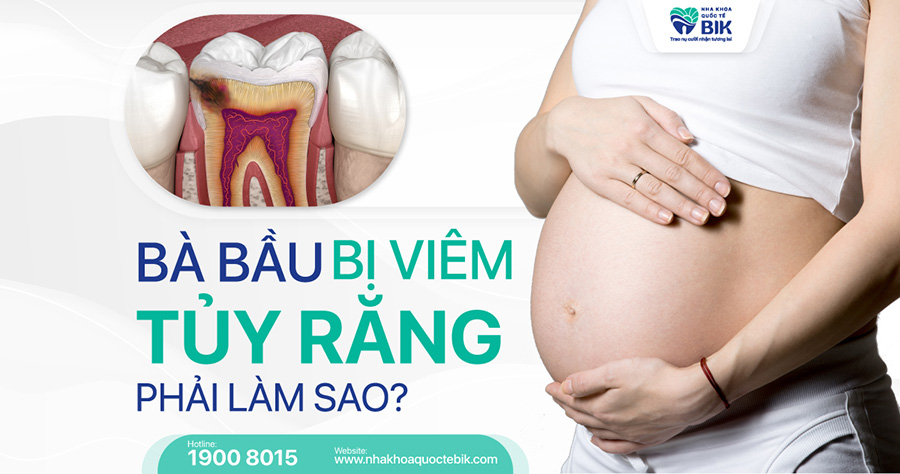
Pregnant women have pulpitis due to many different causes, which can be due to hormonal changes or improper diet and oral hygiene. To ensure the safety of both the mother and fetus, pulpitis treatment at the dentist should only be performed during the middle 3 months of pregnancy, when the health of both mother and child is most stable.
1. Why do pregnant women often have oral diseases?
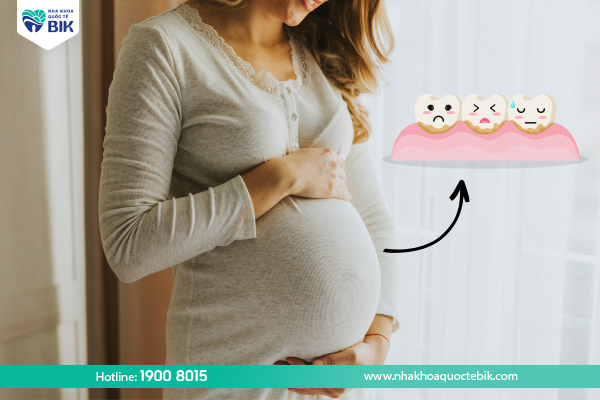
Normally, pregnant women will have changes in the hormones Estrogen and Progestorome. This contributes to the gums being easily swollen and creating the accumulation of tartar as well as bacterial infections in the oral cavity. Therefore, this is the main reason why pregnant women are susceptible to oral diseases, especially tooth decay. If tooth decay is not treated in the early stages, it will lead to pain and inflammation of the tooth pulp.
In addition, nausea and vomiting during pregnancy will cause the acids in the packaging to reflux and erode tooth enamel. At the same time, eating many times a day with foods containing a lot of sugar but not ensuring oral hygiene also makes teeth susceptible to decay, damage and affects the pulp.
2. Signs of pulpitis in pregnant women
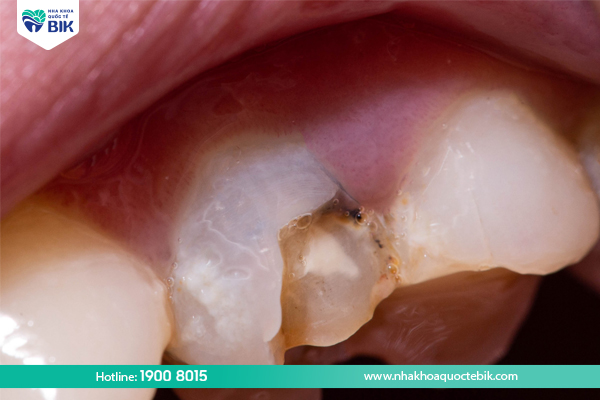
Some signs of pulpitis in pregnant women
Signs of pulpitis are often very easy to recognize and symptoms will vary in each stage:
2.1. In the early stages
In the early stages, the pain caused by pulpitis only appears in episodes and lasts about 10 minutes. If you touch it lightly with your hand or chew food that is too hot or too cold, you will have a painful reaction and persistent discomfort.
2.2. Severe pulpitis
If pulpitis in pregnant women has progressed to a severe stage, the pain will be very intense, each time lasting for hours. Often the pain is more severe and more uncomfortable at night. This affects the quality of sleep of pregnant women, causing negative impacts on their health as well as the fetus.
3. Can pregnant women have root canal treatment?
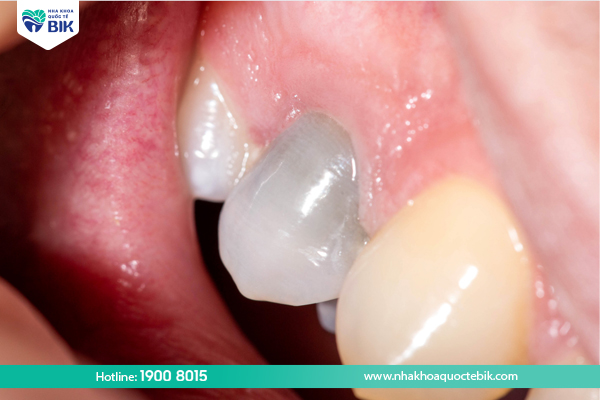
Can pregnant women have root canal treatment? When pregnant, pregnant women can completely treat pulpitis by having root canal treatment at the dentist. However, it is necessary to pay attention to the pregnancy period to ensure the safety of both mother and baby when treating pulpitis.
Treatment of pulpitis during pregnancy is only performed in the middle 3 months of pregnancy, that is, from the 3rd to the 6th month, when the health of both mother and child is stable, the movement of pregnant women during this period is also much more convenient and easier.
During the first 3 months and the last 3 months of pregnancy, pregnant women absolutely should not perform root canal treatment. In the early stages, the fetus has not yet developed stably, so changes in health can affect the baby. In the late stages of pregnancy, supplementing essential nutrients is the most important thing for the baby’s development, so root canal treatment can cause some hindrance.
4. Does root canal treatment for pregnant women affect the fetus?
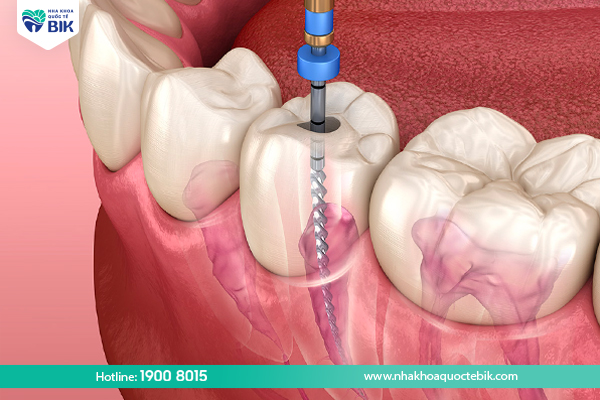
Treatment of pulpitis during pregnancy has a number of factors that affect the health of the mother and baby, specifically as follows:
4.1. General examination
The general examination process before treating pulpitis for pregnant women must undergo an X-ray so that the doctor can accurately determine the condition of the infected pulp. Radiation rays when taking X-rays can cause miscarriage or slow fetal development later. However, this can be overcome by adjusting the radiation and frequency of radiation.
4.2. Injection of anesthetic
Using anesthetics during root canal treatment also has negative effects on pregnant women. Specifically, the type of anesthetic used for dentistry does not affect the fetus, but in some rare cases it can cause some side effects such as: low blood pressure, heart rhythm disturbances, pain, respiratory failure, difficulty breathing, coma, convulsions,…
5. How to treat pulpitis for pregnant women at home

If when going to the dentist, the health is not good enough for the doctor to perform root canal treatment, the pregnant woman will be instructed on some measures to take care of her teeth at home to reduce inflammation and pain:
5.1. Use salt
Salt has the effect of disinfecting, quickly reducing toothache and is an ingredient that is easy to find in any kitchen. After brushing your teeth, the pregnant woman can rinse her mouth with warm salt water. Hold in mouth for about 30 seconds so that salt water can kill bacteria to help reduce sore throat, treat infected areas and then rinse mouth with clean water.
5.2. Ice pack
Ice pack is a simple way to relieve pain for pregnant women at home when they have periodontitis. Place the pack on the outside of the cheek to reduce inflammation in the gum tissue and symptoms of tooth sensitivity and pain. If mothers have a lot of pain, they should apply ice regularly 3-4 times/day, each time about 15-20 minutes.
5.3. Use betel leaf
Betel leaf has the effect of inhibiting the development of tooth decay while reducing pain for pregnant women. In addition, this type of leaf contains many essential oils, alkaloids, benzyl acetate, … which have very good antibacterial and anti-inflammatory effects. Pregnant women can boil betel leaves into a concentrated liquid and then gargle the mixture in their mouths, applying it 3-4 times a day to reduce swelling and pain.
5.4. Using betel leaves
The secretion from betel leaves has been proven to have the effect of eliminating bad odors, inhibiting bacteria, fungi and viruses. Therefore, pregnant women can take betel leaves, wash them, chop them and take the concentrated liquid to gargle every day.
5.5. Fresh mint leaves
If pulpitis causes bad breath, pregnant women can chew fresh mint leaves or use mint tea to improve it. In addition, mint also contains Menthol, which has the effect of numbing and cooling inflamed gum tissue, helping patients feel more comfortable.
6. Proper dental care during pregnancy

In fact, the problem of hormonal changes during pregnancy, different diets or morning sickness during pregnancy is very difficult to change. However, to prevent pulpitis, pregnant women can pay more attention to proper dental care during pregnancy:
– Limit foods high in starch and sugar that can easily cause tooth decay, pulpitis and instead can eat vegetables, fruits or dairy products that provide minerals and calcium for pregnant women as well as for the future development of the baby.
– Brush your teeth at least twice a day, especially after each meal. You can combine dental floss and mouthwash to completely remove food debris.
– Use a mild toothpaste to prevent discomfort and morning sickness.
– Go to the dentist for a careful examination when there are signs of abnormalities in the teeth and gums.
So pregnant women with pulpitis can be treated with specialized measures at the dentist in the middle 3 months of pregnancy. Outside of the above period, pregnant women should not treat pulpitis to ensure safety for both themselves and the fetus. In addition, pregnant women can apply some ways to relieve pain and reduce inflammation at home with natural materials to feel more comfortable.


















